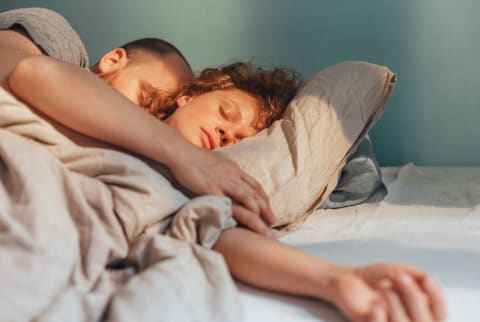The Moon May Affect Men's Sleep More Than Women's, According To New Research


Whether the moon phases actually affect our quality of sleep has long been a topic of debate, so researchers from Uppsala University in Sweden wanted to do a little more digging. In a new study1 published in the journal Science of the Total Environment, they found that men's sleep may actually be more affected by cosmic happenings than women's.
Studying the moon's effect on sleep:
For this study, researchers investigated how the moon affected the sleep of over 800 men and women varying from ages 22 to 81. They measured the participants' quality of sleep using a method called polysomnography (which records brain waves, oxygen levels, and heart rate during the night) at various points during the lunar cycle, then analyzed the results for trends.
What they found.
Based on their findings, the waxing period from the new moon up to the full moon was associated with lower sleep quality (more time spent awake during the night, more time taken to fall asleep) compared to the waning period, from the full moon down to the new moon. But interestingly enough, researchers only saw these results in men.
Women's sleep was "largely unaffected" by the lunar cycle, corresponding study author and neuroscience expert Christian Benedict, Ph.D., said in a news release.
As the study authors note, one explanation for this is that during the waxing period, the moon is getting brighter and is typically in the sky in the late evening (when most people are going to bed). During the waning period, on the other hand, the moon gradually reflects less and less light and shifts into daytime hours.
They add that previous research has shown the male brain responds to changes in red and blue light at a "twofold higher stimulus-response curve" compared to women, which could also contribute to the discrepancy.
The takeaway.
Benedict does explain that this research isn't a firm confirmation of causation between the lunar cycle and quality of sleep, but the results are noteworthy, nonetheless.
If you're someone who notices your sleep feels less restorative in the first half of the lunar cycle, there could be some science behind it. All the more reason to amp up your sleep hygiene during those couple of weeks, so you can ensure you sleep soundly and wake up feeling your best.

Sarah Regan is a Spirituality & Relationships Editor, a registered yoga instructor, and an avid astrologer and tarot reader. She received her bachelor's in broadcasting and mass communication from State University of New York at Oswego, and lives in Buffalo, New York.

